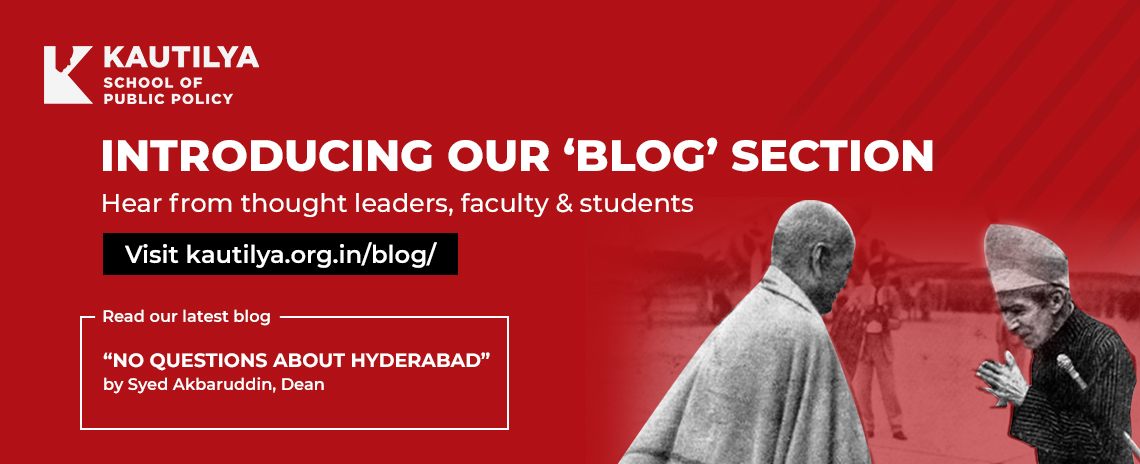OPINION
No Questions about Hyderabad: The Dean’s Take


Syed Akbaruddin,Dean – Kautilya School of Public Policy
I never thought I would ever come back to Hyderabad. When I left in 1985, the city of my upbringing, the not-so-big city at the time, was something I was eager to leave behind in the quest to be a global nomad. After 35 years I am back. Now, a Rip Van Winkle-like figure, I realize that the dusty lanes have been converted into expressways, and the neighbourhood shops have evolved into swanky malls. The quintessential heart of the city of pearls though remains as it was. Along with its neighbour Bengaluru, Hyderabad has grown as a centre for information technology, a pharma hub and a boomtown attracting global investments. Still, the Ganga Jamuna Tehzeeb, a confluence of composite culture, the essence, the ‘Khusbhoo’ of the city, is still strong.
As a ‘Hyderabadi’ who lived mainly outside the city, any reminder of the magic of Hyderabad, any reference would make my day. Ah, Hyderabad – my hometown! Of Course, I regularly saw references to the city in a document at the United Nations. If you guessed what I am alluding to, you deserve a commendation.
It is the notification about the agenda of the United Nations Security Council. There figures the so-called ‘Hyderabad Question’. It is in a list of items that need to be addressed as threats to international peace and security. Till then I had not realized that it warrants such global attention.
The ‘Hyderabad Question’ came on the agenda in September 1948, i.e., 73 years ago. It was last considered by the Security Council 72 years ago in May 1949. It remains a ‘matter’ that the Security Council is ‘seized of.’ The item pre-dates my birth, though I am already a senior citizen. It never was a topic discussed at the UN during my decades as a diplomat. Yet, it remains on the ‘active’ agenda. Take a look at the agenda listed in January 2021. Hyderabad finds a mention at No:54.
For the genesis of this story, consult the Repertoire. It is the official source of information about the practice of the UN Security Council. Check it out here. Now that you have the background consider whether the situation in Hyderabad poses any threat to international peace and security? Or is it merely a reflection of how blind to ground realities some arcane diplomatic practices are? Instantly, you will conclude that Hyderabad has long left the situation of 1948 behind. None here live frozen in that era.
Yet, the representative of a single country annually writes to the UN Secretary-General requesting to keep the matter on the agenda. It is just a case of an envious neighbour. Midnight’s other child could not stop Hyderabad’s integration into the Indian Union in 1948 (read V.P. Menon’s The Integration of the Indian States) and then lost its legal claim to the frozen Hyderabad Funds in a UK Court more than 70 years later (read the judgment by Mr. Justice Marcus Smith). Nonetheless, it clings to the fiction of the ‘Hyderabad Question’ and wants its continuance on the agenda. No one else bothers. Let’s not waste time rummaging through the dustbin of history. You’ve got the context.
There’s a subtext too. I shared this nugget of the follies of diplomatic practice as an example of how we at Kautilya will help you with the learning process. We will show you how to dig deep, but also how to sift the grain from the chaff. We will explain how ground realities change, but practice takes time to follow, and theory is way behind in catching up. That’s how we will approach the entire gamut of issues that encompass the term Public Policy. Welcome to Kautilya’s space for discussion and debate. It is a space to learn together and from each other. Everyone can respond or share their own stories and views. Let the conversations begin.
*The Kautilya School of Public Policy (KSPP) takes no institutional positions. The views and opinions expressed in this article are solely those of the author(s) and do not reflect the views or positions of KSPP.
Rudraram, Patancheru Mandal
Hyderabad, Telangana 502329
